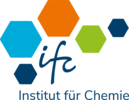Studies and Modules
This page is aimed at students at the University of Oldenburg. Are you interested in studying to become a teacher with us? Then please click here.
Courses
The module catalog of our working group includes numerous courses in the Bachelor's and Master's degree programs. Below you will find an overview of the courses for the 2-subject Bachelor's degree as well as the Master of Education degree programs Gymnasiales Lehramt ("Gym") and Haupt- und Realschule ("HR"). Please note that this is for illustrative purposes only, the information in the module handbook (Stud.IP) is always binding.
Bachelor | che140: Fundamentals of Chemistry Didactics (Lecture & Seminar)
Dates: Part I in the summer semester, Part II in the winter semester. Final examination: comprehensive written examination after part II Credit points: 6 CP
Competence goals: Students learn about and apply strategies and procedures with which they can design chemistry-related learning processes in their later professional life. This includes the ability to apply different teaching concepts in the design of chemistry lessons, to use different media sensibly in lessons and to take heterogeneous learning groups into account when planning lessons. In addition, students recognize the importance of topics such as education for sustainable development (ESD), experimental approaches and internal differentiation in chemistry lessons and the significance of the structure of curricular requirements throughout the school years.
Module content: In the first half of the course, various strategies and methods are presented that can be helpful for learning and understanding chemistry. These include the structuring of subject content using basic concepts, the use of various media and methods as well as the targeted use of experiments, models and model concepts and student ideas. In the second half, basic procedures and methods of designing teaching-learning situations for chemical content in and out of school are presented (e.g. chemistry in context, interdisciplinary learning, the research-developing teaching method) and implemented using students' own considerations and presentations. Approaches from general and subject-didactic learning and motivation research provide the theoretical background for this.
Bachelor | bam: Bachelor thesis module (final module with seminar)
Dates: every semester. Prerequisites for participation: Successful completion of a module in the chosen field. Final examination: Submission of the Bachelor's thesis. Credit points: 15 CP
Information on writing the Bachelor's thesis and finding a topic is listed in detail here
Competence objectives: Students choose a topic for their Bachelor's thesis in consultation with a supervisor. The accompanying course serves to support students in acquiring general and topic-related skills (e.g. structure and organization of a research paper, literature research in specific databases, formulation of research questions and application of suitable methods, data collection and evaluation)
Module content: Students are introduced to the basic questions and methodological working methods of the chosen field and gain an insight into the structures of written qualification papers in the respective subject area. In addition to joint seminar content (e.g. research in specific databases), this module includes around ten individual consultations, participation in selected working group seminars and the preparation of the Bachelor's thesis
Master | Gym, HR | che719: Experimental school chemistry (seminar & practical course)
Dates: Every semester. Final examination: Active participation in the seminar, max. seven graded protocols in the practical course Credit points: 6 CP
Competence objectives: Students become familiar with a variety of experiments in different fundamental subject areas of school chemistry and are able to plan, implement and optimize them. Writing experimental protocols enables students to decide which subject content is necessary for understanding the experiments and to critically reflect on the experiments. As part of the internship, students also learn how to use digitalization in the field of experimental work, which is didactically processed in the associated seminar with regard to individual support and differentiation. For their own later lesson planning, they practise developing experimental and conceptual lesson proposals and reflecting on them in terms of subject-specific didactic issues
Module content: In the practical course and in the didactic seminar, the important subject areas of secondary levels I and II are explored; these include methods for separating and detecting substances, the introduction of chemical reactions, the experimental exploration of the structure of matter, introduction to organic chemistry, thermodynamics, electrochemistry and kinetics. In the didactic seminar, the experiments are reflected upon from a didactic perspective. Various didactic issues will be taken up for discussion and related to the respective topic (e.g. topic-related student ideas, interests or learning difficulties).
Master | Gym | che742: Presenting interdisciplinary content (seminar & block practical course)
Dates: Every summer semester. Final examination: Preparation and presentation of an experimental lecture on a given topic (45 min, ungraded), written elaboration of the experimental lecture (graded). Credit points: 3 CP
Competence objectives: In this seminar, students demonstrate that they can independently explore an interdisciplinary topic in chemistry teaching and reflect on it from a didactic perspective, taking into account the literature on chemistry didactics.
Module content: Students prepare an experimental presentation for their topic. Based on the subject-specific clarification, students identify important thematic content and select well-founded experiments, which they then present in the lecture together with a subject-specific introduction. In addition, they develop ideas for possible implementations in chemistry lessons.
The specialization module Chemistry Didactics (che752) consists of two courses. The seminar Concepts of Chemistry is compulsory.
Master | Gym, HR | che752: Concepts of Chemistry (compulsory, seminar)
Dates: Every winter semester. Final examination: 1 oral examination (approx. 30 min.) or 1 term paper (max. 10 pages) or 1 written examination (max. 120 min.) Credit points: 3 CP
Competence objectives: In this module, students combine subject-specific and subject-didactic skills by linking the subject-specific aspects of the basic concepts of chemistry with the arrangement of teaching content and mapping them in spiral curricula. In addition, they acquire skills in areas of chemistry teaching that incorporate interdisciplinary skills in particular. These skills also include the consideration of heterogeneous learning groups and differentiating tasks
Module content: As part of the seminar, the most important topics of chemistry lessons (including the structure of matter, selected material chemistry, electrochemistry, kinetics, thermodynamics, metals, acids/bases) are linked to the basic concepts and considered in a spiral curriculum. Particular attention is paid to the development of pupils' skills.
Master | Gym, HR | che752: Language-sensitive chemistry teaching (compulsory elective, seminar)
-Information will follow soon -
Master | Gym, HR | che752: The ChemOL student laboratory: teaching current topics in a practical way (compulsory elective, seminar & student laboratory)
-Information will follow soon -
Master | Gym, HR | mam: Master's thesis module (final module with seminar)
Dates: every semester : At least 60 CP in the Master of Education. Final examination: Submission of the Master's thesis. Credit points: 27 CP (Gym), 20 or 21 CP (HR)
Information on writing the Master's thesis and finding a topic is listed in detail here
Competence objectives: The accompanying course serves to support students in acquiring in-depth topic-related skills (e.g. literature research and evaluation in specific databases, further development of research questions and selection of suitable methods, data collection and evaluation).
Module content: Students choose a topic for their Master's thesis in consultation with a supervisor.



